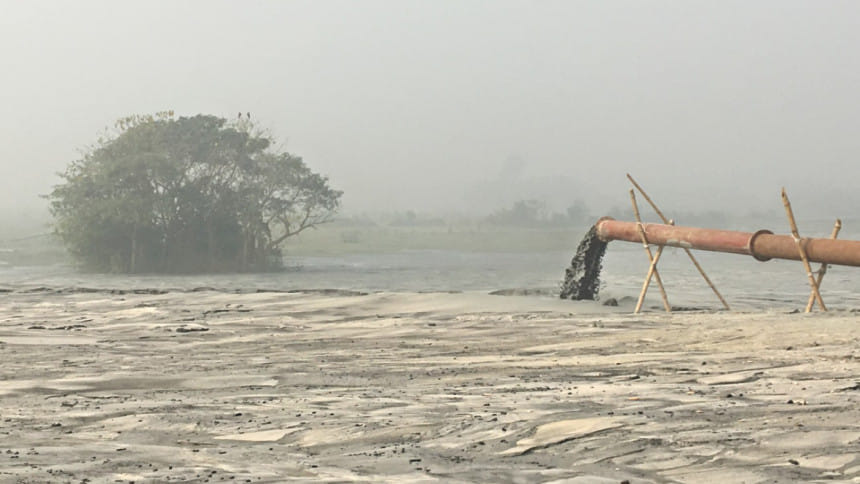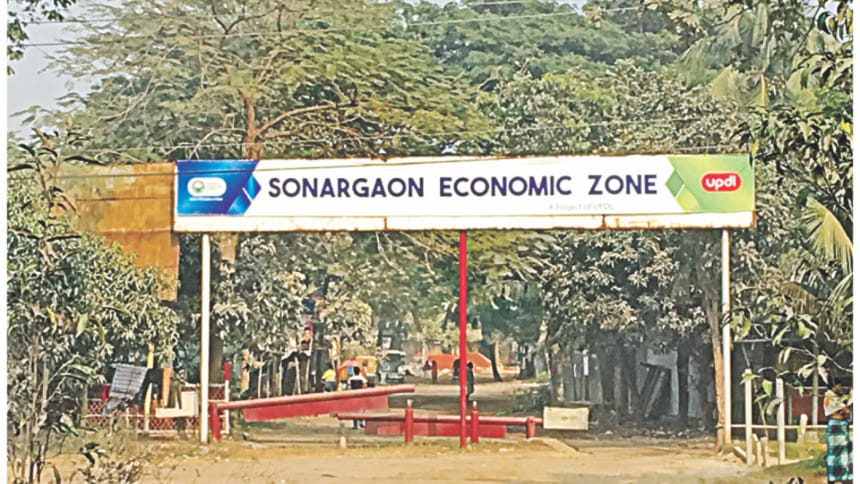Dumping sand on farmland

It was a foggy winter morning in Kandargaon village of Sonargaon. Elderly farmer Hashem Ali, wrapped in a shawl and a woollen cap on, was frantically wandering around his bed of paddy seedlings in the middle of the vast farmland on the Meghna in Narayanganj.
Ali's paddy seedbeds, along with mustard plants, trees, shrubs and grass were all being buried under piles of sand, threatening to turn the farmland barren.
“We have to go hungry this year,” a weeping Ali told this correspondent, “Seedbeds have been ruined as far as you can see ... with nothing to grow, there will be no harvest.”
Like every year, many villagers like him have sown paddy seedlings for IRRI rice cultivation, which was to begin a month later. The high-yielding IRRI enables many farmers to feed their families all year round.
On January 3, developer of a proposed private economic zone ignoring a High Court injunction resumed filling up the farmland putting people's livelihoods in peril, said the villagers.
Over a dozen machines roar day and night, devouring acres of farmland every day, they said.
Unique Hotel and Resorts Ltd, a concern of Unique Group, is the developer that is constructing a private economic zone named Sonargaon Economic Zone. They have even put up a signboard “Sonargaon Economic Zone” by the Dhaka-Comilla highway in Pirojpur union.
In March 2014, the High Court banned destruction of the ecologically-sensitive agricultural land, adjoining wetlands and ecology of the river foreshores of six moujas -- Jainpur, Chaihishya, Char Bhabnathpur, Bhatibanda, Pirojpur and Ratanpur.
Enayet Ullah Mollah, who is organising the affected locals to protect their agricultural land, said, “Now, with the developer carrying on their work in spite of the order of the High Court, who should we turn to?”
Over 12,000 inhabitants of 10 villages in the six moujas are dependent on the agricultural land, he said. Of the total 2,350 bighas of arable land, 1,500 bighas are under 11 IRRI rice cultivation schemes of the government.
Three IRRI schemes are already damaged in Char Bhabanathpur and Bhatibandha -- thanks to sand filling by the same company between 2009 and 2011, he said. With the fresh sand filling, the farmland in Kandargaon now faces obliteration, Enayet added.
In 2009, Unique Property Development Ltd, another company of Unique Group, embarked on a massive sand filling project in a portion of the Meghna river, adjoining low-lying wetlands, and multi-crop agricultural land in the six moujas to make way for its real estate venture named Sonargaon Resort City.
This project had not obtained any environmental clearance from the authorities concerned.

This act of destruction was thwarted in late 2011, when the HC issued the injunction. A mobile court of the department of environment also slapped a hefty fine on the firm for causing colossal damage to agriculture, environment, and aquatic ecology.
Two years on, the same conglomerate returned to the scene with the same objective. Only the names of the firm and the project were different. In late September last year, this firm of Unique Group started earth filling work in the same farmland.
The HC in its order had not only asked the developer to not cause any further damage to the villagers' land, but also ordered the developer to restore the damaged area to their original state.
The managing director of the developer company in response to the HC injunction had then told the court that they had removed the sand that they used to fill up the land in that area till that date and that they would ensure that the environment and the agriculture were preserved in their future projects.
“We have undertaken tree plantation and other environment-friendly activities to ensure environmental equilibrium at the site,” reads an excerpt from the statement the company had submitted to the court.
The company meanwhile obtained a pre-qualification certificate from Bangladesh Economic Zone Authority in late August last year with 12 preconditions for final licence and it also had a gazette notification issued in its favour.
Of the preconditions, the salient one is that the company will provide an environmental impact assessment along with an environmental management plan to the BEZA.
However, an official gazette notification issued by the BEZA on August 4 last year said the private economic zone is proposed in Charbhabanathpur and Bhatibanda moujas with 63 acres of land in its ownership and it called upon people to lodge complaints if they had any.
According to BEZA officials, the conditional pre-qualification certificate given by BEZA and the official gazette can, in no way, allow a developer to start filling arable land, especially when there is an HC injunction.
“The act of filling farmland with the HC ban in effect is illegal,” said Rubayet Hayat Shiplu, local assistant commissioner for land, “To my knowledge, there is no licence for a private economic zone at this site.”
He said he wrote to local police to take action. “There is a verbal instruction of higher authorities not to take any action against it,” he said.
Rabbi Miah, deputy commissioner of Narayanganj, said, “I have given formal instruction to stop the illegal act and I will talk to the assistant commissioner to know who forbade him.”
He said he wrote to Sonargaon upazila nirbahi officer, officer-in-charge of the local police station and Unique Group managing director on January 10 to stop the illegal earth filling.
In early August last year, executive chairman of BEZA issued the pre-qualification certificate in favour of Sonargaon Economic Zone. For final licence, it requires environmental impact assessment, feasibility study, undisputed land ownership, site master plan, and rehabilitation plan.
The department of environment exempted the company from initial environmental examination in a letter issued in December last year but it said without the clearance in the environmental impact assessment, the project authority shall not be allowed to conduct earth filling or any kind of physical intervention on the proposed project site.
The Narayanganj DC in a letter in October, however, informed the BEZA executive chairman that there was no scope for allowing the filling of agricultural land for the economic zone in the said moujas.
Syeda Rizwana Hasan, chief executive of Bangladesh Environmental Lawyers Association which had filed the writ petition with the HC and won the injunction against the land filling, said it was a businessman's brazen defiance of the HC.
“Some people consider themselves above the law and they have proved time and again that they are above the law,” she said, adding, “It only gives an alarming message to the society.”
“And the remedy is to ensure the highest punishment for contempt of court, restoring the farmland to its original state, and providing compensation to the affected villagers and farmers,” said Rizwana.
Officials who failed to monitor and take action should also face the music, she said.
Mohammad Noor Ali, managing director of both Unique Hotel and Resorts Ltd and Unique Property Development Ltd, claimed that it was a priority project of theirs and that they were developing a housing scheme no more.
“The land is not agricultural anymore,” he claimed, adding, “The government has issued gazette notification for an economic zone at the site and there is no court injunction on sand filling there.”
“We will obtain the environmental approval after filling up the land,” said Noor.
Japanese investors are interested in this economic zone and it will be an economic hub with thousands of jobs, he said.
“In case some people are affected and if they come to us with complaints, we will compensate them … ,” said Ali.
According to Bangladesh Bureau of Statistics findings, the country is losing agricultural land at a rate of around 1 percent every year and is feared to lose a third of its agricultural land in the next 25 years unless the trend is halted.
Prime Minister Sheikh Hasina in April last year at Krishibid Institution said the government would not allow indiscriminate industrialisation destroying cultivable land and forests.
She also said industries would be accommodated in 100 special economic zones to be built across the country.

 For all latest news, follow The Daily Star's Google News channel.
For all latest news, follow The Daily Star's Google News channel. 



Comments